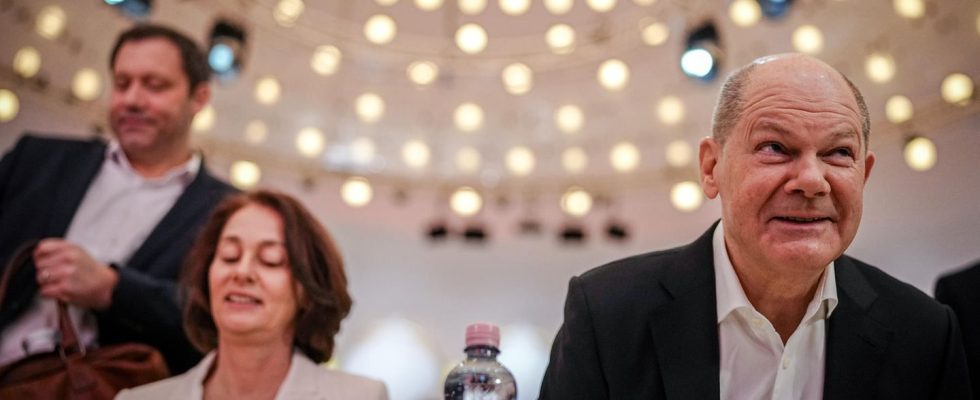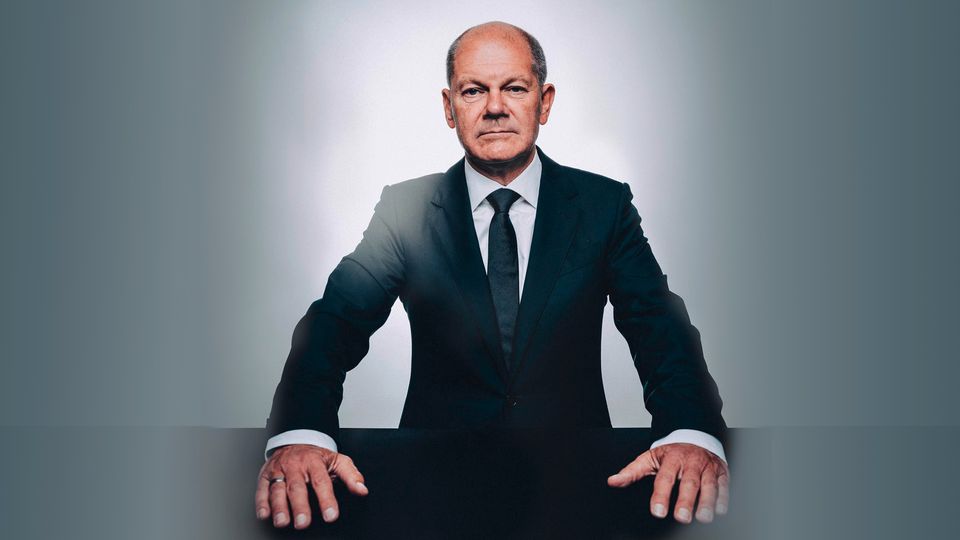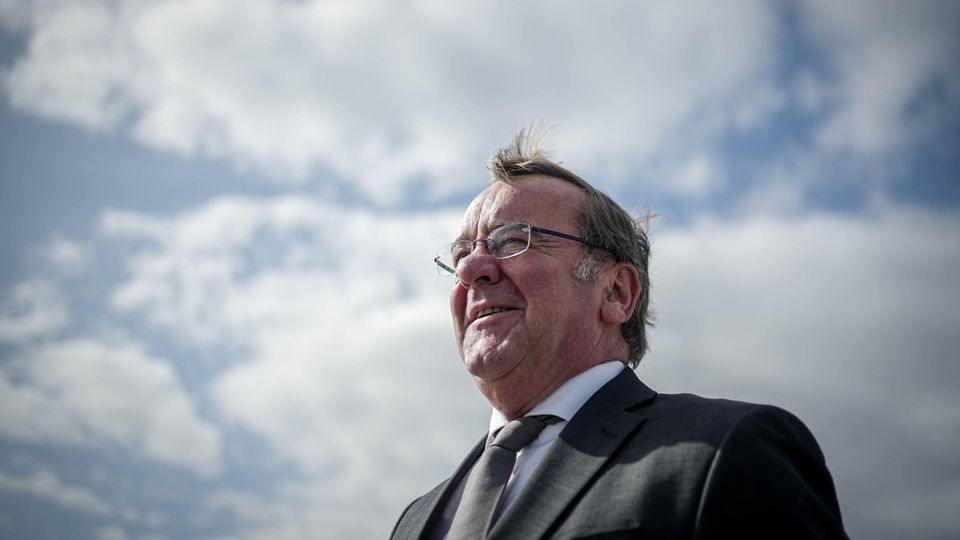First self-critical, then statesmanlike: Olaf Scholz is trying to give his chancellorship a new appearance. Whether it will be successful could become clear as early as Wednesday.
If that’s the new Scholz sound, then it sounds hoarse and snuffy. The Chancellor has a cold. The head of government, clearing his throat, doesn’t want to fit in with the motto that the SPD set for its EU delegates conference on Sunday in Berlin: “Germany’s strongest voices for Europe.” The Chancellor takes it with humor.
Some virus told him that he needed to help with his voice, Scholz jokes at the lectern. “But I hope that I can still be understood,” he says. His comrades hope so too.
Scholz’s approval ratings are in free fall, those of the SPD are in the basement. Quite a few see a connection. Scholz is also politically troubled. The coalition continues to argue incessantly, the Chancellor still doesn’t have the business under control – the SPD, which is threatened with many defeats in this super election year, also has to suffer.
The Chancellor, who was hardly visible after the turn of the year, is now making his presence felt. He gave a remarkable interview, spoke at the EU party conference, and the budget debate follows on Wednesday. Scholz must try to disperse the bad mood in the party and faction, present himself as a fighter and open his eyes to the future.
The Social Democrats have therefore carefully noted what the Chancellor hinted at a few days ago: self-criticism. In a conversation with “Zeit”, the Chancellor was thoughtful. He spoke about the heated mood in the country, the increasing dissatisfaction with the traffic light coalition and his administration. And if you wanted, you could even read between the lines: I got it.
Scholz, previously undeterred and unwavering, struck a new tone. Will everything be different now?
Olaf Scholz, objective and statesmanlike
In any case, the 150 delegates in the Berlin Congress Center won’t hear any of this Scholz sound. In his 20-minute speech, the Chancellor doesn’t say a word about the criticism of the traffic lights, nor about the criticism of himself. Crisis? Yes, but in a larger context. Scholz considers other things to be crucial – and the debates at home to be comparatively insignificant. That’s the message he wants to send here.
Scholz is concerned with the rise of right-wing populists in Europe, which must be prevented. A new world order that arises from the growing prosperity in South America and Asia and requires new alliances. But especially Ukraine, which must not be left in the lurch in its defensive battle against the Russian invaders.
This makes it clear how Scholz wants to be seen: as a statesman who thinks big-picture. As a leader you can rely on. And as Chancellor, a rowdy coalition is even more rocked.
We have now reached a “crucial point,” warns Scholz with regard to military aid for Ukraine. He doesn’t seem to have high hopes that the US – the most important donor to the attacked country – will be able to resolve their dispute over further military aid in the near future. European aid should therefore not stop, emphasizes Scholz. Not even that of the Germans, the second most important supporters so far.
In the 2024 budget, which is to be passed this week, Germany has earmarked seven billion euros for Ukraine. “That’s a lot of money,” says Scholz. And it is currently “more than half” of what all EU states are currently raising together. It is a clear appeal to the Macrons and Melonis in the international community to get more involved.
Scholz, once decried as a hesitant and procrastinator, is now setting the tone and setting the pace in Europe. This pleases the comrades who celebrate their Chancellor for his objective and pragmatic speech. He has done worse with a better voice, praises someone who is not suspected of being a big fan.
On Wednesday it applies to Chancellor Olaf Scholz
But can the statesman Scholz inspire beyond the grateful sphere of the party conference? Together with top candidate Katarina Barley, he will shape the image of the SPD campaign for the European elections. General Secretary Kevin Kühnert, as the top campaign manager, is fully relying on the chancellor effect – which is at least courageous given his miserable popularity ratings. And no alternative. Banning the unpopular chancellor from election posters would be tantamount to a vote of no confidence.
That doesn’t make the situation any better. Parallel to the EU elections on June 9th, there are several local elections, and a new state parliament will be elected in three eastern German states (Saxony, Thuringia, Brandenburg) in the fall. If you believe the polls, the comrades have to expect the worst. Especially since the political opponent is likely to try to make every vote one about Scholz and his traffic light coalition.
The much more important and difficult speech for the Chancellor is on Wednesday in the Bundestag. Then the general debate is about the budget, which blew up in Scholz’s government’s face following a ruling by the Federal Constitutional Court. The savings that were now negotiated through hard political work could not improve the battered traffic light image. The cuts in agricultural diesel have led to nationwide farmers’ protests, and there has also been clear criticism within the government factions of the lonely agreement between the Chancellor, Finance Minister Christian Linder (FDP) and Economics Minister Robert (Green) Habeck.
Scholz will have to find the right words under the glass dome of the Reichstag in the hope of being able to calm the bad mood in the traffic lights and the disturbed relationship with the voters. Opposition leader Friedrich Merz will open the debate, provoke the Chancellor with his criticism and repeatedly portray him as unfit for office. How will Scholz react? What sound will he hit then?
SPD members of the Bundestag are hoping for an empathetic chancellor who avoids empty phrases and empty words. Who even takes responsibility for the latest mess in order to make it clear to voters: I understand. However, some people question whether Scholz will still reach voters.
The hope that the Chancellor could fundamentally change his communication style is not widespread in the SPD. Nevertheless, it is also pointed out that the crisis also presents an opportunity. All eyes are on Scholz. He may not have wanted it, but Scholz has a platform. Now he just has to prove that he can hit the right note.



